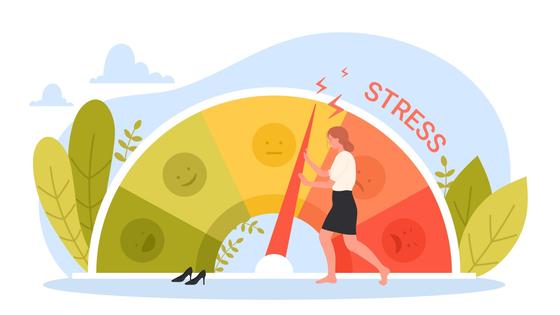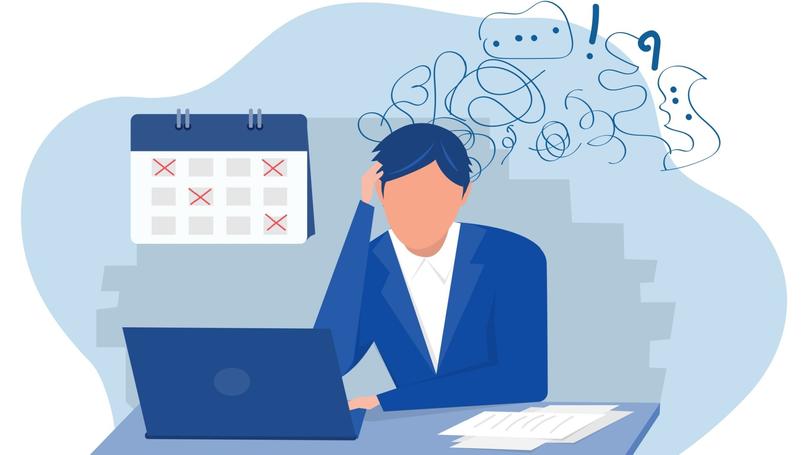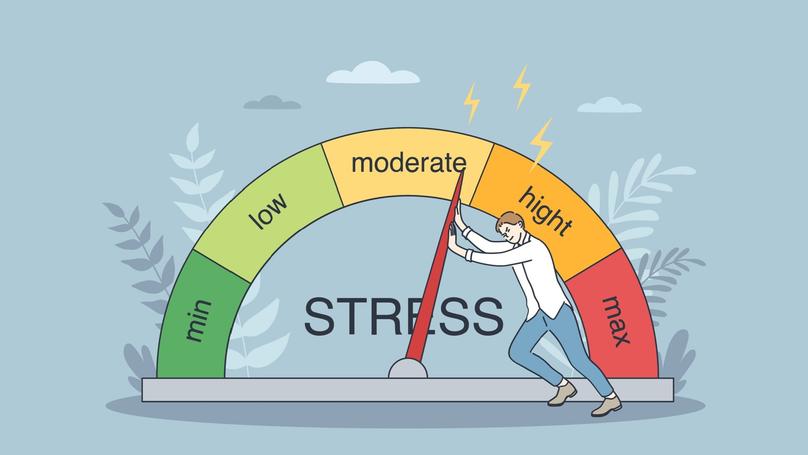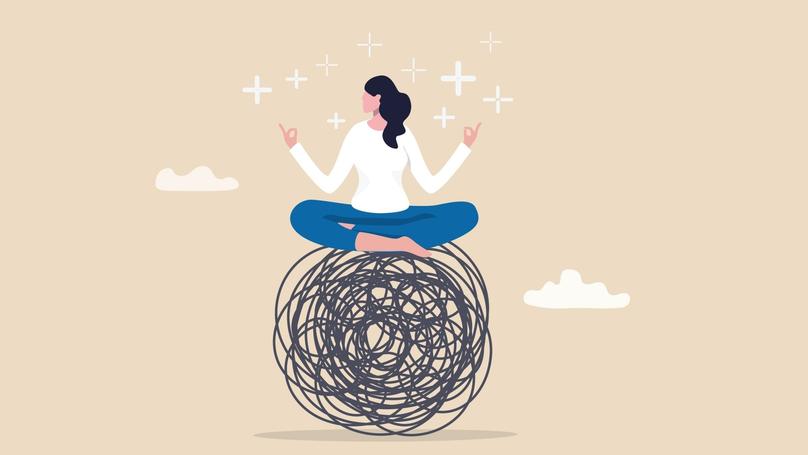How to manage stress at work and keep yourself on your toes
Stress is a universal phenomenon. Stress can consume us for various reasons, not only in our personal lives but also in our professional lives.

It often occurs when, at first, we bravely cope with the most complex of tasks, meet deadlines, and end up doing the work of two people. Nevertheless, after some time, we can no longer face doing our once favourite job and come up with various reasons for our non-attendance at work. Therefore, stress can diminish our operational efficiency, profoundly impact critical business matters, and hinder our ability to collaborate seamlessly within a team. This is why stress management techniques guide experienced professionals. Let's discover how to manage stress and maintain a healthy psychological environment in the team.
What is stress really, and how does it unfold?

Stress occurs when the body responds to external factors, including conflicts, fatigue, overwork, and excessive stress. Furthermore, unforeseen and pleasant life changes, a total absence of change, monotonous routines, and the mundane aspects of everyday life can all contribute to stress. Therefore, we can say that stress manifests as tension resulting from significant physical or psychological effects on the body, which can include professional stress. Likewise, stress is a tense state that arises directly from professional activity.
It is important to understand that stress is a normal reaction; This is how an individual combats excessive stress and enhances productivity. Consequently, some of the symptoms of stress can include:
-
Absent-mindedness and reduced concentration - when it becomes increasingly difficult for a person to perform familiar, routine tasks.
-
Irritability and increased quick-temperedness - when even the smallest thing can make a person angry.
-
Constant fatigue and increased tiredness - lack of strength and energy even for a hobby.
-
Weakened and neglected health can lead to the emergence of detrimental habits, disrupted sleep patterns, frequent headaches, and compromised immunity.
This indicates that your body has been subjected to prolonged serious stress and that you have taken on too many responsibilities. As a rule, people do not tend to think about the consequences of being overworked, particularly for their psychological health. However, it is crucial to prioritise addressing these matters!
In addition, the causes of stress can include:
- Physical danger, for instance, if an individual becomes a robbery victim, witnesses a crime, experiences an accident, or faces a natural disaster.
- Social and psychological factors, including negative memories, self-rejection based on appearance, apprehension about the future, overwhelming emotions leading to emotional fatigue, and particular personality traits. Which can include perfectionism, hyper-responsibility, reluctance to delegate tasks, an obsessive need for control, and a pessimistic outlook on the world.
- Work environment or professional circumstances. These stress factors can also be divided into two different types:
- Physical reasons - Challenging work environments, extended work hours, frequent business travel across different time zones, etc.
- Emotional reasons - Facing an excessive workload, juggling multiple roles, engaging in monotonous tasks, lacking acknowledgement or rewards for professional efforts, experiencing unfair treatment from management, dealing with an unfavourable psychological atmosphere, and encountering heightened workplace conflicts.
Experiencing stress too often, or even chronic stress, can lead to developing more serious illnesses, psycho-emotional disorders, and burnout. Experienced professionals employ stress management techniques to mitigate the effects of stress, enabling them to handle their stress levels and quickly recover efficiently.
Strategies for coping with stress: stress management techniques

Stress management is about managing stress, which allows you to recover from it far more quickly and minimise the consequences. Certainly, handling this process can be quite challenging. However, the key lies in mastering control over this state and minimising the risk of stress.
You can learn how to manage stress by using the following practices:
1. Physical activity
When stress overwhelms you at work, adopt a "here and now" approach. Consider taking short breaks to move around, perform exercises, or even walk. According to scientists, our bodies instinctively prepare for protection when faced with stress. As a result, muscles involuntarily tense up, awaiting relief.
2. Routine activity
Engaging in these activities can rapidly alleviate sudden work-related stress. Consider keeping your hands busy with something while allowing your mind to rest and unwind. For example, you could tidy up your desk, get your documentation in order, water your flowers, or make yourself some coffee.
3. Basic relaxation
Relaxation is an effective way to alleviate stress and restore emotional balance. Here are the three most common relaxation techniques:
- Autogenic meditation (visualisation)
Scientists have long demonstrated that our subconscious cannot distinguish between real events and visualised images. Therefore, vivid daydreams can give a person the same pleasant emotions and feelings as what is happening in reality. To practice autogenic meditation, close your eyes, breathe evenly, and immerse yourself in imaginary scenarios. Furthermore, focusing on the details - the colours surrounding you in your subconscious mind, sounds and smells, and tactile sensations is important. The more precise and vibrant the image you reconstruct, the quicker it will transition from the subconscious to consciousness, resulting in a therapeutic impact.
- Deep breathing
This simple technique can be used several times during the day. At the same time, you can do this anywhere. To do this, you must be in a comfortable position and try to relax as much as possible. Following this, inhale, and exhale slowly, concentrating on the air entering your lungs, and feel it within your whole body. Repeat this exercise several times until you feel relaxed and more peaceful.
- Muscle relaxation
This experience is referred to as voluntary muscle relaxation. This method will help you calm down quickly by counteracting the noticeable muscle tension experienced during mental stimulation. To do this, you need to be in a comfortable position. To achieve a state of tranquillity, mentally scan every part of your body, stating to yourself: "I am relaxed. I am calm." Start with your head, shoulders, and back, gradually relaxing every muscle. Finish this relaxation exercise with a positive affirmation: "It's effortless for me. I feel relaxed and calm."
Lectera’s Online Courses by topic
4. Healthy selfishness and self-care
You need quality relaxation if you know you have been experiencing stress for some time and cannot eliminate it. Please take a few hours of free time and devote it to yourself. It is best to do this within nature, for instance, by walking in the forest, riding a bike, rollerblading, or hiking. Freeing your mind from unnecessary thoughts can help recharge your energy and vitality. Additionally, consider spending your leisure time on sports or your favourite hobby. When you lack the energy to engage in activities that once brought you joy, consider prioritising sleep. Our bodies can be particularly vulnerable to irritations because of a lack of proper rest. Therefore, strive to obtain sufficient rest daily without disrupting your sleep routine.
5. Communication
When feeling stressed, don't hesitate to seek help. Reach out to your colleagues or manager, as they can offer invaluable advice to help you navigate an emerging challenging situation. Having someone to share your concerns with is crucial. Sometimes, it becomes essential to talk through all the accumulated issues and collaboratively find solutions to the current situation.
6. Behaviour modification
The well-known expression can replace a complex psychological term: "If you cannot change the situation, change your attitude towards it!" Consider approaching the situation that triggered a negative response from a fresh perspective. Sometimes, what initially seems stressful can reveal new insights when viewed differently. First, accept this as fact, then try to identify the positive aspects of what occurred. It is also important to vigilantly examine your own statements. For instance, avoid saying, 'I have problems at work.' Instead, opt for a more constructive approach by stating, "A challenging situation has emerged that demands focused attention." For example, you should never say, "I have problems at work." Instead, it is better to say, "A difficult situation has arisen that requires special attention."
7. Practice mindfulness
This is the name of a psychological concept aimed at a deep understanding of current events. In other words, you must learn to perceive your environment, your internal state, and the feelings, emotions, and desires experienced in the moment. To cultivate a mindful mindset, regularly ask yourself: "What am I feeling right now?" By doing this, you enhance your connection with reality, heighten self-awareness, regulate stress, and gain the ability to manage it effectively.
It would be best to use all the suggested techniques - lead an active, healthy lifestyle, make new acquaintances, and communicate more, use affirmations and meditation, and practice mindfulness and behaviour modification. However, you can explore various techniques and discover what resonates most effectively with you.
What is well-being, and why is it important to know?

Well-being encompasses an individual's holistic health, including physical, emotional, and social characteristics. Achieving balance across all facets of life, including your work environment, contributes to overall well-being.
Therefore, the idea of well-being encompasses creating an optimal and nurturing work environment that empowers employees to unlock their full potential, broaden their professional horizons, enhance existing competencies, and acquire new skills-all while experiencing complete job satisfaction. We can say that this is a unique approach to corporate culture that is necessary for business prosperity. It involves, for example, providing employees with training in time management, effective delegation of responsibilities, and prioritisation, encouraging friendly relationships within the team, fostering mutual assistance and support, and promoting constructive conflict resolutions. A comfortable workspace and designated areas for rest and breaks should also be ensured. Put within the context of well-being, a manager's responsibility is to establish an environment that is both psychologically and physically comfortable and inviting. Employees should uphold the organisation's shared values, foster mutual support, champion creative initiatives and ideas, and collaboratively navigate challenging situations. Successful companies are often those where employees collaborate closely in a friendly and cohesive team. Did you know that a thriving business's primary "energy source" lies in its motivated and engaged team? It's absolutely true!
This is why managing stress and maintaining a comfortable psychological environment is especially important. While it's impossible to entirely eradicate stressors from our lives, understanding stress management techniques allows us to mitigate the effects of prolonged stress and develop effective coping strategies.
Share this with your friends via:
Latest News

A significant stage in the development of the alternative education system has begun in West Northamptonshire in the UK: the County Council is actively calling on parents, guardians, and trustees to participate in shaping the future of this key area.

Outwoods Primary School in Atherstone, Warwickshire, having experienced deep sadness after the loss of their famous cat, Silla, has found solace in a new pet – a Maine Coon named Aloysius O’Hara.

In modern universities, artificial intelligence, and in particular ChatGPT, is rapidly transforming from a controversial tool into a full-fledged student assistant.

An innovative educational project is gaining momentum in UK primary schools, aiming to change attitudes towards video games.

The Massachusetts Institute of Technology (MIT) presents MIT Learn – a revolutionary online platform that opens a “new front door” to access university knowledge and resources.












 Test. Check Your Social Media Dependency Level!
Test. Check Your Social Media Dependency Level!
 Test: What Business is Right For You?
Test: What Business is Right For You?
 “I’m Here for the Long Haul”: When Loyalty to a Company Becomes Toxic
“I’m Here for the Long Haul”: When Loyalty to a Company Becomes Toxic
 Test: How Prone Are You to Abusive Behavior as a Manager?
Test: How Prone Are You to Abusive Behavior as a Manager?
 Test. What superpower would you possess if you were a superhero?
Test. What superpower would you possess if you were a superhero?
 Test. What Should You Let Go of Before Winter Ends?
Test. What Should You Let Go of Before Winter Ends?
